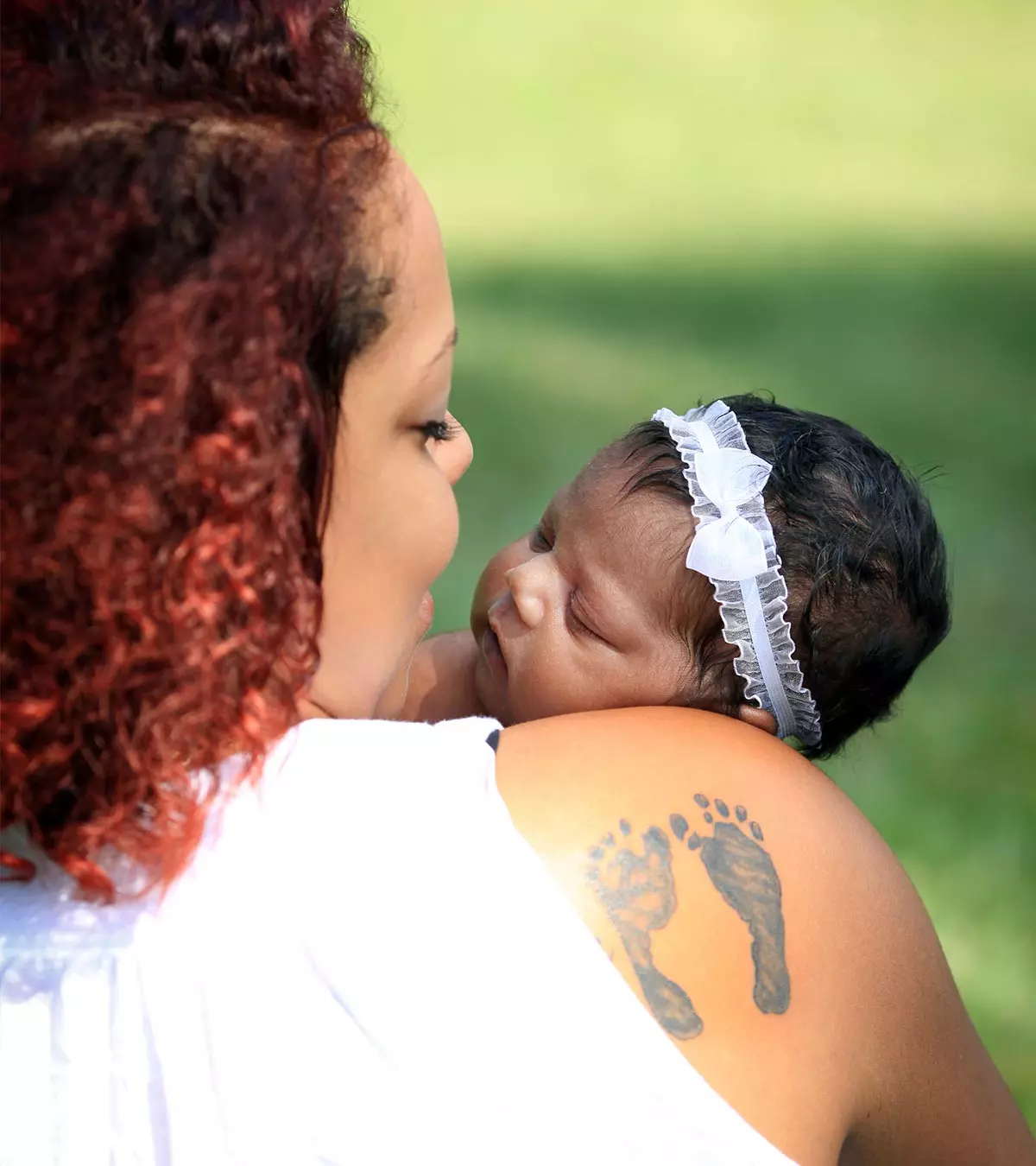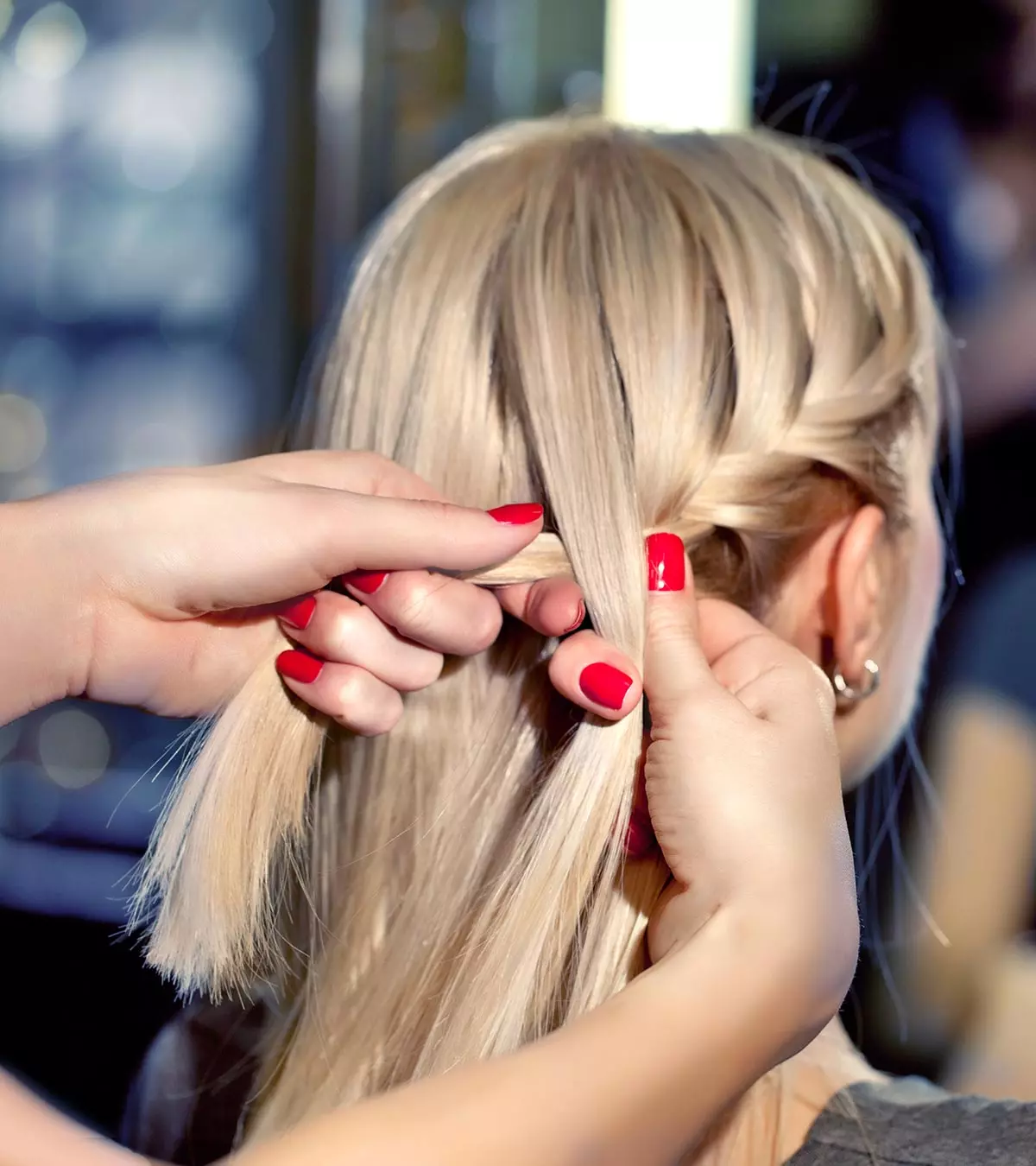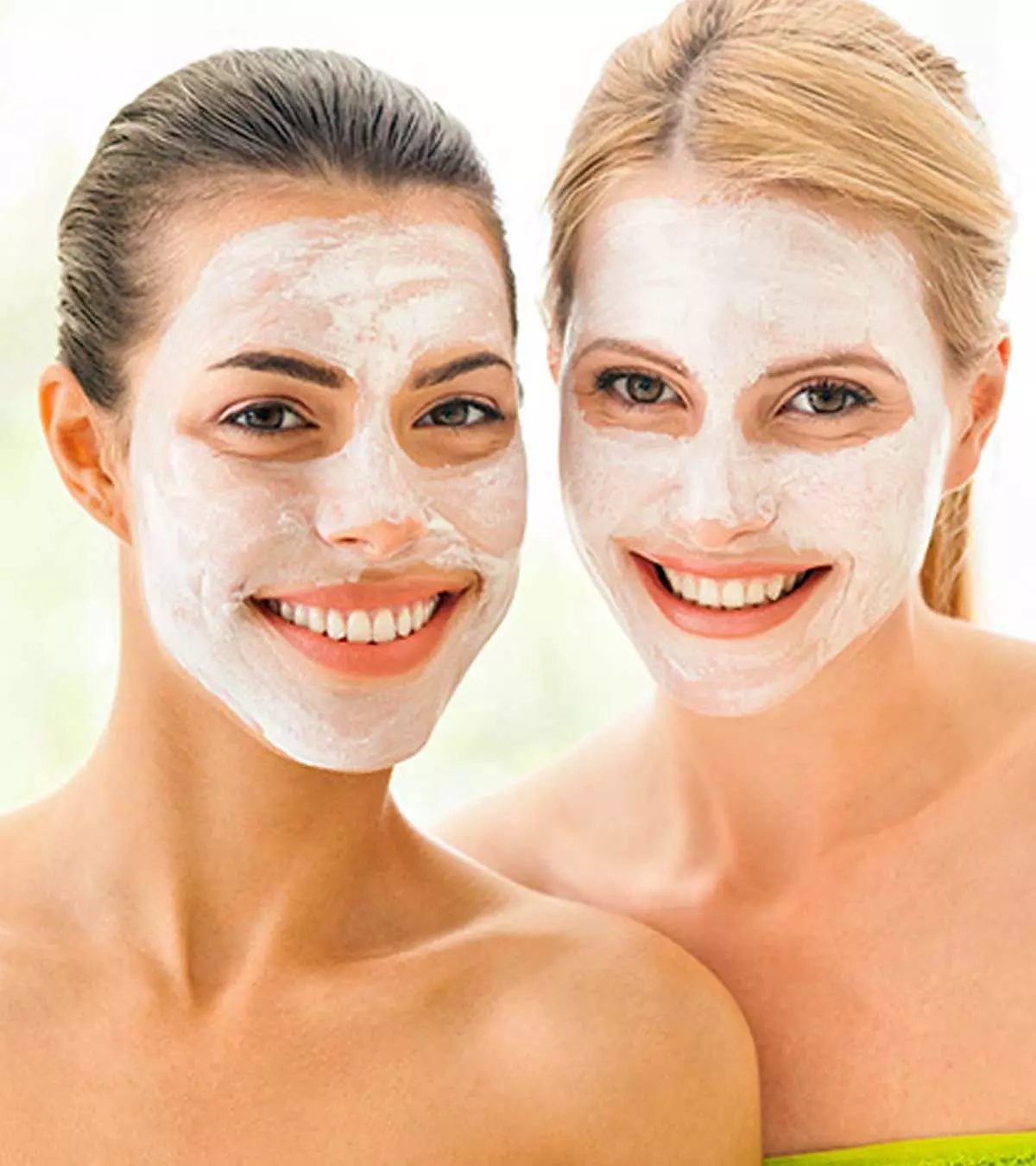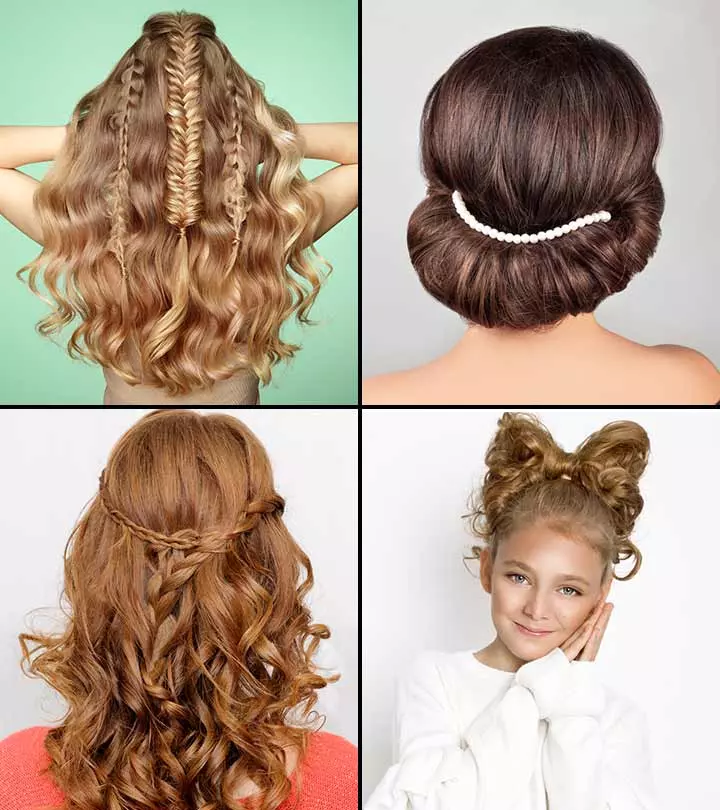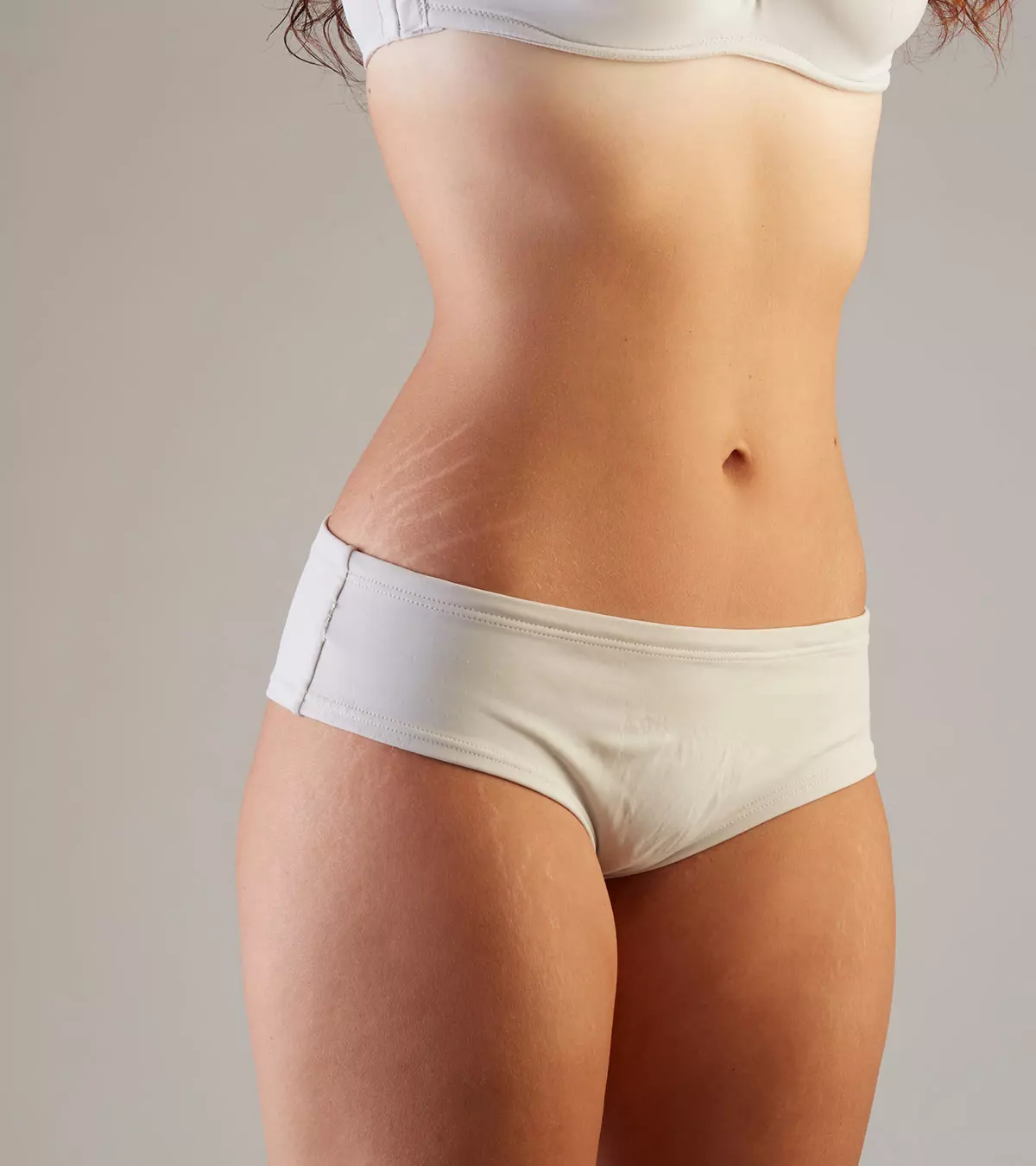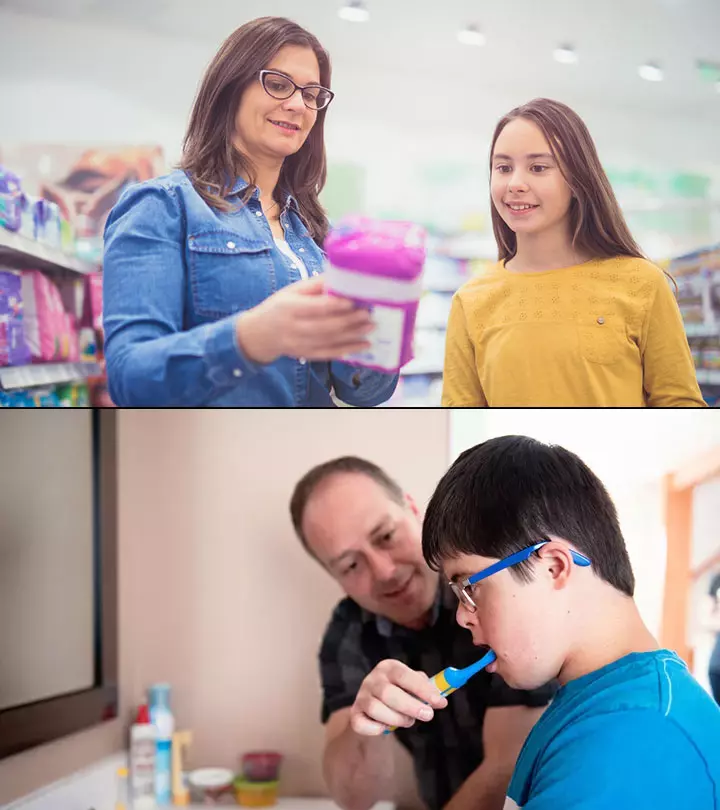
Image: Shutterstock
Learning the importance of personal hygiene for teens is essential to help them maintain good health. Personal hygiene is a set of practices used to keep one’s body clean, promote good health, and avoid disease (1). Children pay attention to basic personal hygiene routines until late childhood, such as coughing while covering their mouths and washing hands after meals. However, when they enter adolescence, this list expands to include certain new habits critical to the teen’s health and well-being. Learning about personal hygiene is important during the teenage years, as it affects their health, social interactions, and confidence. As their bodies go through many changes, teenagers benefit from understanding how to care for their hygiene effectively. You may assist your teen in developing a good personal hygiene regimen as a parent. This post discusses the importance of teenagers maintaining personal hygiene, how they can do so, and parents’ role in this endeavor. Keep reading!

Key Pointers
- Teenagers must maintain proper hygiene to prevent disease and infection and maintain a healthy body.
- Good hygiene practices include toilet hygiene, bathing, nail and hair care, oral hygiene, and period hygiene, among others.
- Laziness and lack of awareness are major reasons why teenagers neglect personal hygiene.
- Delayed cognitive development can also lead to poor hygiene practices, requiring simple step-by-step instruction.
- Parents should educate their children on personal hygiene before they reach puberty.
Why Is Personal Hygiene Important During Teenage?
Hygiene and grooming during teenage years is essential for good health, just like it is important for children and adults. In addition to the general reasons for personal hygiene, teenagers have some specific reasons (2).
- It helps maintain cleanliness and avoid exposure to infections and diseases. For instance, cleanliness during menstruation helps teenage girls prevent any potential infections.
- During puberty, teenagers develop larger sweat glands and sweat more than younger children. Regular bathing can eliminate body odor and enhance confidence (3)
- It helps them stay comfortable while being around people. This could boost a teen’s self-esteem, and motivate them to lead a healthy lifestyle. It also helps them adjust to the social norms of adulthood, where hygiene is a part of one’s personality.
- Adolescence is marked by new changes such as the growth of body hair and an increase in body odor in teens. Good personal hygiene helps keep their private parts clean and avoid body odor.
- It can also help them stay disciplined and focused on the goals that they have set for themselves.
 Quick fact
Quick factTypes Of Personal Hygiene For Teenagers
Personal hygiene is a dynamic term that encompasses several types of self-hygiene practices such as bathing, washing hands, brushing teeth, etc. Following are the various categories of good hygiene habits (3) (4) (5) (6).
- Skincare: The skin of teenagers might get oilier as they attain puberty. Oily skin traps dust and dirt and thus serves as a breeding ground for germs. It leads to the development of several skin issues, such as acne and blackheads. Therefore, it is good for a teen to develop a proper skincare routine by regularly washing their face with mild soap or facial cleanser and water. Consult a dermatologist if the teen faces persistent skin issues. The doctor can prescribe appropriate skincare products, such as mild acne cleansers and creams, and also suggest easy skin care tips for teens.
- Haircare: Teenagers go out more often than children. This way, their hair (as well as skin) tends to become dirty. Also, hormonal changes might make the hair oily and smelly. The thickness of the hair only compounds the problem. Therefore, encourage your teen to wash their hair with a mild shampoo twice or thrice a week. They may also nurture their hair by applying some homemade or other hair care products after consulting a trichologist (hair doctor).
- Nail care: Teenage is the time when they like to grow their nails, style them into different shapes, and design them. However, fingernails are an ideal breeding ground for germs. These germs can transfer into the mouth while eating with hands. Touching the face can also cause the germs to get into the mouth, eyes, and nose, or on the skin. Thus, it is necessary for your teen to have a nail care routine. They can scrub the dirt out using a nail brush. Besides, a weekly clipping should help get rid of dirt and reduce the possibility of painful ingrown nails.
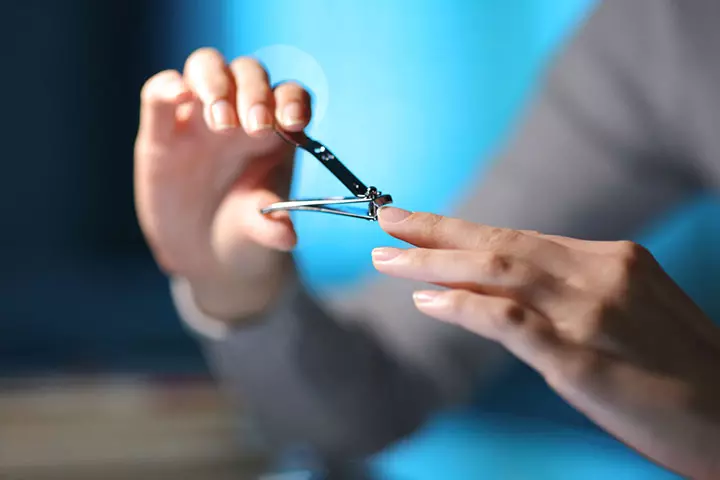
 Did you know?
Did you know?- Oral care: Poor dental care can lead to problems such as bad breath and tooth decay. Make your child brush and floss their teeth twice a day. They should also wash their mouth after meals, either with plain water or with a mouthwash.
- Washing hands: Hands can spread germs to almost any part of the body. It is necessary to wash hands before and after meals, after playing outdoors, after feeding or playing with pets, after using the toilet and after any other situation where they touch a contaminated surface. Create a fun hand washing routine so that teens do not try to bypass it.
- Bathing: Body odor develops due to the development of a new type of sweat gland during adolescence, in the armpits and genital areas. The bacteria on the skin feed on the compounds in the sweat from these regions and cause body odor. Therefore, you need to explain to your teen that bathing or showering, especially after physical activity, helps remove sweat and bacteria and prevents body odor. They may also use an antiperspirantiA topical product used on the skin to reduce sweating. to control sweat production or deodorant to prevent body odor.
- Toilet hygiene: This might not be a new hygiene practice for teens; however, it needs to be updated once they hit puberty. They should be advised on wiping their genitals every time after using the toilet and washing them while bathing as teens normally have some secretions from their genitals.
 Trivia
Trivia- Menstrual hygiene: Teaching menstrual hygiene to a teenage girl involves guiding them to track their periods, use hygiene products such as a sanitary pad (reusable or disposable), or tampon, and their safe disposal after use. A teenage girl should also be given directions on the correct usage of these products, and their frequency of changing these products (7).

- Shave safe: Teenage boys can develop a mustache or beard, depending on their hair growth. If the boy wishes to shave, then you can buy them shaving cream and a teen-friendly razor. Teach them how to shave their facial hair carefully without inflicting injuries. Similarly, teen girls, who want to remove their underarm hair, need to be told about the importance of using sterilized equipment and to be careful while shaving their genital area, and to avoid removing this unless absolutely necessary. You can teach them proper pubic hair grooming techniques to avoid shaving accidents. Also, teach them about after-shave skin care routine and why they should not share their paraphernaliaiArticles used for a particular purpose/activity. with others.
- Clean clothes and shoes: It is important to change clothes, especially undergarments and socks, every day. Clothes retain dead skin cells, sweat, and other body fluids that can harbor germs. Teens who wear clean clothes and shoes can effectively combat puberty-related issues such as body odor and smelly feet. Maintaining clothing hygiene can also make you feel refreshed.
Practical Tips For Teens
The following tips can help support your teen in maintaining their hygiene and building confidence. Here are some effective strategies to consider:
- Set a hygiene routine: Support your teen in establishing a daily routine that includes showering, oral care, and basic skincare.
- Explain the benefits: Tell the teen how maintaining good hygiene can be beneficial. Talk to them about how staying clean and groomed can make them appear confident and mature.
- Make hygiene fun: Let the child choose the kind of products they want to use to keep them from feeling controlled. You could also use technology such as hygiene apps to motivate them.
- Provide positive reinforcement: Compliment your teen’s efforts in maintaining good hygiene to build their self-confidence.
- Model good habits: Demonstrate good hygiene practices in your routine, indicating that these habits are important at every age.
Common Myths About Teen Hygiene
Personal hygiene is sometimes surrounded by myths that can lead to confusion, especially for teens learning new routines. Let’s address some of the most common myths about healthy hygiene habits.
- Myth: Daily showers aren’t necessary.
Fact: Taking a shower each day helps control body odor and supports healthy skin (8).
- Myth: Brushing teeth once a day is sufficient.
Fact: Brushing twice a day is essential for preventing cavities and keeping your breath fresh (9).
- Myth: Personal hygiene is only meant for girls.
Fact: Personal hygiene is important for everyone, irrespective of gender (10).
- Myth: Multiple products are required to keep the skin clean
Fact: A simple skincare routine with a gentle cleanser, moisturizer, and sunscreen can help keep the skin healthy (11).
- Myth: Deodorant can be skipped during winter
Fact: Sweat and body odor can result from hormonal changes and stress (12). Therefore, it is important to wear deodorant year-round.
Personal Hygiene For Teens With Additional Needs
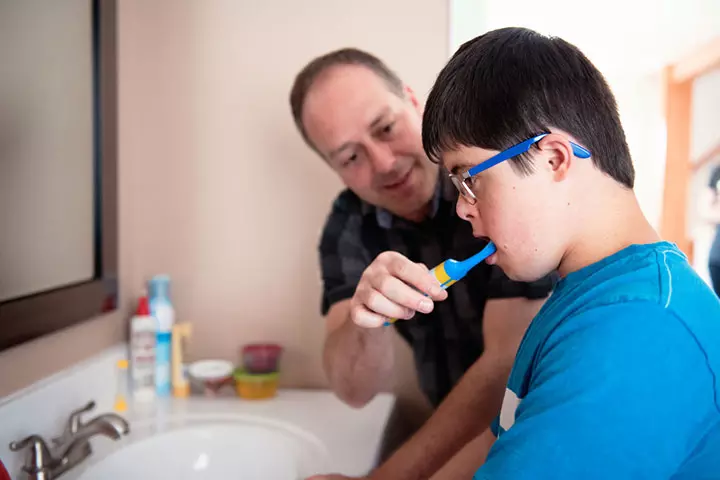
Teens with additional needs are likely to need extra support.
- Understand your child’s learning ability and style. Acknowledging these factors can help you communicate with ease. For example, if a child understands better by seeing, then demonstrate the steps and show them what to do.
- Consider breaking hygiene activities into small and simple steps. It can make it easier for the child to understand and remember the activity.
- Perform a hygiene-related activity at the same time each day. It will help the teen anticipate the activity, keep track of it, and also make it convenient to recollect the steps.
- Write down the personal hygiene schedule to help them follow a routine. You could also use picture guides for activities such as flushing the toilet to explain the importance of each step.
- You can take the help of a professional for discussing personal hygiene needs related to menstruation or wet dreams.
Why Do Teens Face Personal Hygiene Issues?
The following are some of the common causes for teens to face personal hygiene issues.
- Lack of awareness: This is one of the most common reasons for a teen to show disinterest in personal hygiene. The teen may not be aware of the importance of hygiene and the steps they need to take in this regard.
- Habit of procrastination: They may tend to postpone their bath or avoid taking a bath or brushing their hair if they have no plans of going out for the day. They may take it easy on washing their hands after using the toilet or before eating. These instances might be fewer in teens who have been oriented into personal hygiene from a younger age itself.
- Delay in cognitive development or mental health problems: Some teens may have an issue in maintaining basic hygiene routine due to cognitive development delay or some mental health problems such as depression. In such special cases, either the teen is not able to understand the importance of personal hygiene, or they forget the steps to perform the practice.
- Peer pressure: Peers and social media play significant roles in shaping hygiene habits. Teens may feel pressured to meet specific standards, which can have both positive and negative effects on their hygiene practices. Parents can assist by encouraging open conversations about the importance of hygiene and self-care.
- Lack of access to hygiene products: Teenagers may not know which hygiene products suit their skin, hair, and body type. Experimenting with products could make their skin sensitive, discouraging them from maintaining personal hygiene. Others may face financial barriers to buying essentials like deodorant, shampoo, and toothpaste.
How To Talk To Your Teen About Personal Hygiene?

You may take the following steps to talk to a teen about personal hygiene.
- The best phase to strike a conversation about personal hygiene is at the beginning of puberty. It can ensure that by the time your tween enters adolescence, they are well-prepared for the changes they might experience.
- Do a quick research on the issue that you want to discuss. It will help you share correct information with your teen.
- Pick a quiet and alone time for the conversation. A teen who is at ease can participate in the conversation comfortably.
- Keep the participants of the conversation limited to you and the teen to respect their privacy. It will also help your teen develop trust in you, and they will likely confide in you in the future as well.
- Share your observations and tell them how poor hygiene habits could become a problem. However, while talking, ensure that you do not make it seem shameful and embarrassing. It is good to start your conversation by praising your teen and then slowly progress to the areas that need improvement.
- Share about the social aspects of hygiene. Share live examples and be a role model. Guide them with examples of how hygiene is important for physical, physiological, mental, and social health. For example, when you talk about oral hygiene activities, talk about a relative or friend, who ended up going for a root canal treatment because they were not brushing and flossing their teeth.
- Once you have shared your part, ask your tween or teen if they have any questions or suggestions to make. Listen to them patiently and make them feel heard. Try to answer what you can and show that you are willing to help them.
- Be supportive and continue to communicate about their personal needs. Bring them all necessary personal hygiene items as per their needs. Take your teen along to shop for their personal care products.
- Praise and reward the teen appropriately when you see positive changes. If the teen does not improve, then set some strict hygiene rules.
- Seek a professional’s help if you observe any erratic behavior related to personal hygiene that you cannot sort out.
Frequently Asked Questions
1. How do I encourage teenage hygiene?
You can encourage good hygiene habits in your teenager in the following ways:
- Talk to them about the importance of maintaining healthy hygiene habits
- Model proper hygiene maintenance
- Have a set timetable for self-care
- Include nutritious food in their diet
- Educate them about the physiological changes that take place during puberty
2. What does lack of hygiene cause?
Lack of hygiene can be related to the following conditions (13)(14)(15)(16)(17)(18):
- Tooth decay
- Diarrhea
- Athlete’s foot
- Lice in the body
- ScabiesiAn itchy skin rash caused by mites.
- Rashes
- RingwormiA skin infection caused by fungus resulting in a red circular rash. infections
3. How often should teenagers shower or bathe, and what products should they use?
Dermatologists recommend parents ensure their children shower or bathe daily during puberty. Using gentle soaps without added fragrance and moisturizing afterward is especially important for dry skin or in arid regions (19).
4. How can parents help their teenagers develop good personal hygiene habits?
Parents can help their teenagers develop good personal hygiene habits by starting early, reinforcing messages about hygiene, and being open to discussions about puberty and periods. Being a role model, teaching proper handwashing, promoting regular bathing, using deodorant, changing clothes, and maintaining dental hygiene are important practices to instill (20).
5. What is the importance of brushing and flossing teeth regularly for teenagers?
Regular brushing and flossing are essential for teenagers because it promotes healthy teeth development. Proper oral hygiene maintenance prevents tooth decay, bad breath, and gum disease. Parents should encourage the daily use of dental floss and brushing twice a day using fluoride toothpaste to effectively clean the gaps between teeth (21).
Maintaining proper personal hygiene for teenagers is important as they undergo many physical and psychological changes during this period. Proper hygiene helps reduce the risks of infections and other diseases in teenagers. So, teach your child about ways to take care of their skin, hands, nails, hair, and intimate areas with the help of a few tips from this post. Ensure that you guide your child about being aware of hygienic habits. Moreover, following these tips on self-care for teens will also help boost their confidence and self-image.
Infographic: Types Of Personal Hygiene For Teenagers
Personal hygiene involves taking care of different body parts to keep them clean and healthy. Also, teenagers undergoing hormonal fluctuations and exposure to various products and environments need extra care. So the infographic below details different types of personal hygiene and how to maintain them. Save and share it with your peers too!
Some thing wrong with infographic shortcode. please verify shortcode syntax
Illustration: Personal Hygiene For Teens: Importance And Tips To Teach Them

Image: Stable Diffusion/MomJunction Design Team
Girls, learn the importance of hygiene! Get tips on how to stay clean and healthy. Don’t miss out – start taking care of yourself today!
References
- Jenan M. Al-Rifaai et al.; Personal hygiene among college students in Kuwait: A Health promotion perspective; National Center For Biotechnology Information
- Hygiene: pre-teens and teenagers; Raising Children
- Hygiene for young people and teenagers; NHS
- Clean and Nearly Teen: Personal Hygiene; St. Louis Children’s Hospital
- Personal hygiene for children; Health Direct
- Taking Care of Your Teeth; Kids Health
- Rajanbir Kaur et al.; Menstrual Hygiene, Management, and Waste Disposal: Practices and Challenges Faced by Girls/Women of Developing Countries; Hindawi
- Sweating and body odor; Mayo Clinic
- When and how often should you brush your teeth?; Mayo Clinic
- Personal Hygiene; Vrindavan University
- Preteens and skincare: What parents should know; CHOC
- Smells like teens and tweens: How to deal with body odor; Children’s Wisconsin
- Oral Hygiene
- Diarrhoeal disease.
- How To Prevent Athlete’s Foot.
- Lice and Scabies: Treatment Update
- Alireza Sanei-Dehkordi et al.; (2025); Risk factors associated with scabies infestation among primary schoolchildren in a low socio-economic area in southeast of Iran.
- Ringworm in Children.
- How Often Should Your Kids Take a Bath or Shower?; Cleveland Clinic
- Hygiene: pre-teens and teenagers; Raising Children
- Dental care for teenagers: 12-18 years; Raising Children
Community Experiences
Join the conversation and become a part of our nurturing community! Share your stories, experiences, and insights to connect with fellow parents.
Read full bio of Dr. Nirmala Shireesh Dharap
Read full bio of Swati Patwal
Read full bio of Deepa Thomas
Read full bio of Dr. Joyani Das






